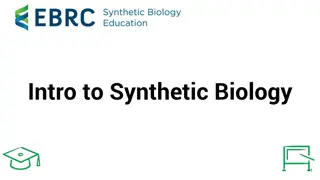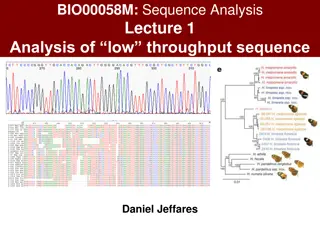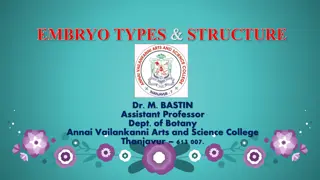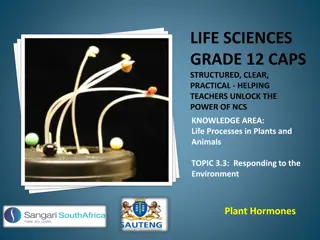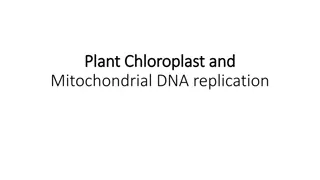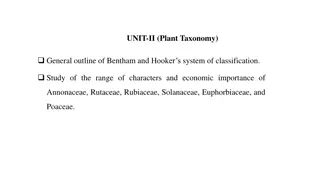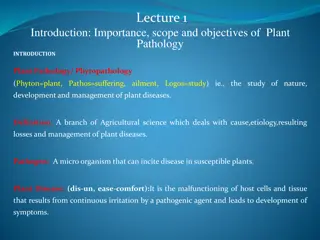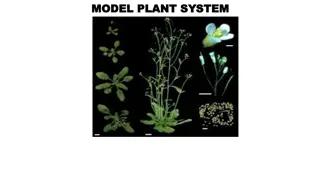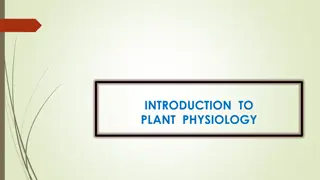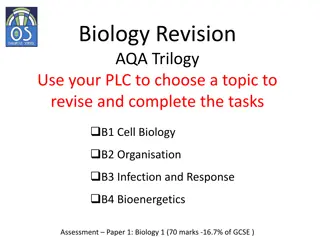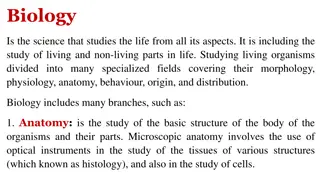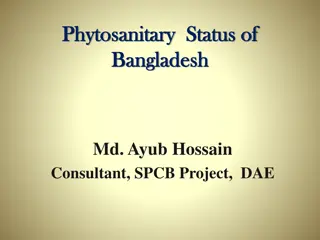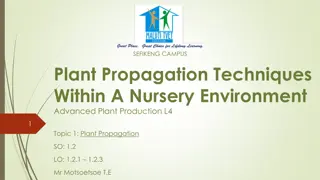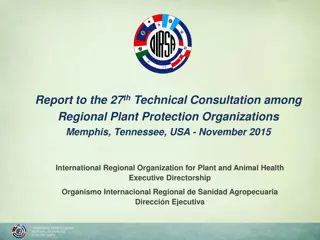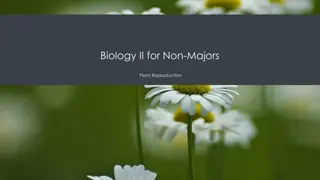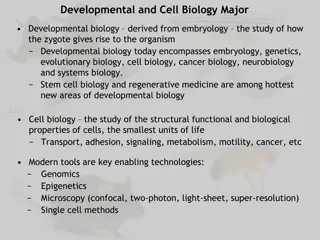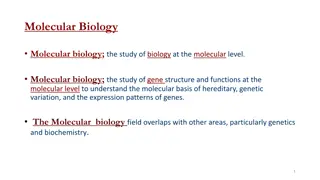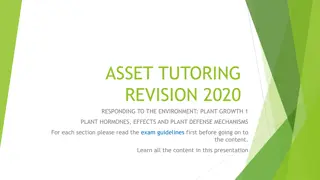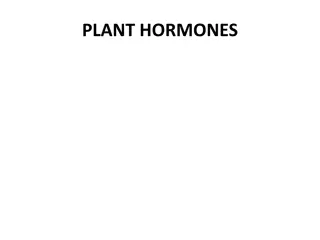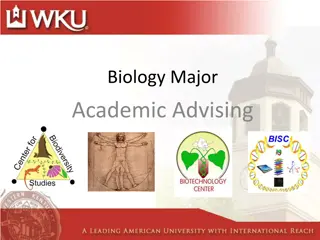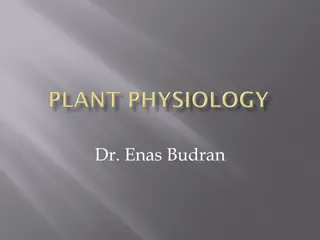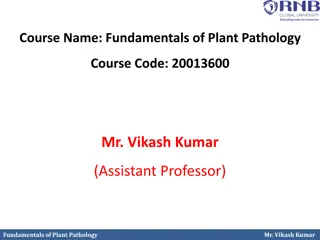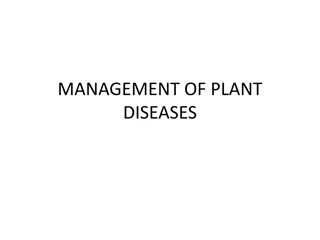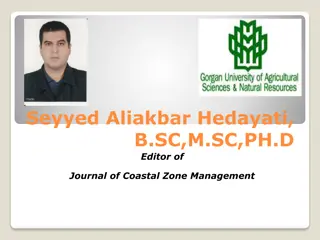Unit 1: Introduction and History of plant pathology
The science of plant pathology, which studies plant diseases and aims to protect the food supply by improving plant survival in unfavorable conditions. Explore the causes of plant diseases, their symptoms, and methods of prevention and control.
5 views • 13 slides
Amway Nutrilite All Plant Protein Powder 1kg Deutsche Post AG
Amway Nutrilite All Plant Protein Powder is a premium source of protein derived from plant-based ingredients. With each serving, you get a blend of high-quality protein to support your active lifestyle and dietary needs.\nAmway Nutrilite All Plant Protein Powder offers a convenient way to supplement
1 views • 4 slides
8th Singapore Junior Biology Olympiad 2023 Pre-registration Briefing Information
The 8th Singapore Junior Biology Olympiad (SJBO) 2023 aims to promote the advancement of Biology among Secondary School students from Sec 2-4 levels in Singapore. This prestigious competition encourages students to excel in Biology by focusing on practical skills and critical thinking. The structure
1 views • 34 slides
Achieve Greatness Conquer the IB Biology Diploma Programme Exam
Unlock your potential and excel in the IB Biology Diploma Programme Exam with our comprehensive study resources. Gain access to practice tests, study guides, and expert guidance to elevate your performance. Start your journey towards academic success today!\nClick Here to Get IB-Biology Dumps With 1
0 views • 6 slides
Introduction to Synthetic Biology: Understanding the Core Concepts and Applications
In this introductory lecture on synthetic biology, you will explore the fundamental principles of engineering biology, including the design and construction of new biological entities. The focus is on leveraging molecular, cell, and systems biology advancements to create biological systems that can
0 views • 89 slides
Transformative Power of Sequencing in Molecular Biology
The falling costs of sequencing have revolutionized various fields like genetics, genomics, cell biology, microbiology, and evolutionary biology. Sequencing data has enabled us to understand genomes, revolutionize cell biology techniques, conduct comparative genomics, population genomics, and metage
1 views • 31 slides
Understanding Plant Embryogenesis: A Comprehensive Overview
Plant embryogenesis is a crucial process in the development of plant embryos from fertilized ovules, involving cell division, differentiation, and morphogenesis. This process leads to the formation of seeds, which play a vital role in the plant life cycle. The stages of embryo formation, structure,
0 views • 25 slides
Understanding Plant Tissue Culture: Methods and Requirements
Plant tissue culture involves the in-vitro culture of plant explants under aseptic conditions, covering cell, organ, and suspension cultures. This process, pioneered by German botanist Gottlieb Haberlandt, relies on the totipotency of plant cells. Key requirements include laboratory organization, su
0 views • 18 slides
Understanding Plant Hormones and Their Functions in Plants
Plant hormones play crucial roles in various plant processes such as growth, development, and response to environmental stimuli. Auxins, gibberellins, and abscisic acid are key plant hormones that regulate tropisms, cell division, elongation, flowering, seed germination, and dormancy. Understanding
0 views • 50 slides
Plant Mitochondrial and Chloroplast DNA Replication Mechanisms
Plant mitochondria and chloroplasts have intricate DNA replication processes. Mitochondrial DNA replication is independent of the plant cell cycle and is associated with specific proteins in nucleoid complexes. Plant mtDNA contains more genes than animal mtDNA, with a complex structure involving int
1 views • 16 slides
Overview of Bentham and Hooker's Classification System in Plant Taxonomy
Bentham and Hooker's system of classification in plant taxonomy, outlined in Genera Plantarum, provided detailed descriptions of families and genera based on original plant dissections. This classification system has practical value for plant identification, with keys for taxa and subdivisions for l
2 views • 47 slides
Understanding Plant Tissue Culture Media and Their Importance in In Vitro Growth
Plant tissue culture media play a crucial role in the in vitro growth and morphogenesis of plant tissues. The composition of culture media depends on the specific plant species and the type of material used for culture. Various types of media, such as White's medium, MS medium, B5 medium, N6 medium,
0 views • 6 slides
Basics of Biology: Introduction, Branches, and Importance
Biology, the study of living organisms, encompasses various branches such as botany, zoology, morphology, and genetics. Understanding biology is crucial for solving environmental issues, conserving natural resources, and pursuing careers in diverse fields like medicine and agriculture. Living organi
0 views • 9 slides
Understanding Plant Pathology: Importance, Scope, and Objectives
Plant pathology, also known as phytopathology, is the study of plant diseases and their management. It covers the causes, symptoms, and impact of pathogenic organisms on plants. The field aims to understand the interactions between plants and pathogens, develop control methods, and reduce losses in
0 views • 6 slides
Understanding Plant Developmental Biology and Model Systems
Plant development involves various processes like embryo formation, seed germination, and organ differentiation. Advances in plant developmental biology have led to the study of Arabidopsis as a model system, helping understand plant growth and genetics.
7 views • 13 slides
Introduction to Plant Physiology: Exploring the Functioning of Plants
Plant physiology is a crucial subdiscipline of botany that delves into the processes and functions operating within plants. This field closely examines areas like plant morphology, ecology, cell biology, and genetics, shedding light on vital processes such as photosynthesis, respiration, and more. T
1 views • 7 slides
European Standards for Plant Biostimulants Development
The European Committee for Standardization (CEN) plays a crucial role in developing European standards for plant biostimulants, focusing on improving plant nutrition processes independently of nutrient content. The CEN/TC.455 committee is responsible for creating standards supporting the EU Fertilis
2 views • 5 slides
Biology Revision with AQA Trilogy: Cell Biology and Organism Organization
In this biology revision session for AQA Trilogy, we delve into topics like cell biology, organism organization, diffusion, osmosis, active transport, enzymes, and more. Explore the differences between prokaryotes and eukaryotes, understand cell specialization, and learn about key processes like mit
0 views • 8 slides
Understanding Plant Tissue Culture: Techniques and Applications
Plant tissue culture involves maintaining and growing plant cells, tissues, or organs in artificial mediums under controlled conditions. It allows the regeneration of whole plants from small plant parts or cells. Hormones like auxins, cytokinins, and gibberellins are used in the process. Proper envi
3 views • 5 slides
Plant Structure and Function in Biology II for Non-Majors
Explore the intricate world of plant cells and tissues in Biology II for Non-Majors. Learn about the different types of plant cells - parenchymal, collenchymal, and sclerenchymal - each with unique structures and functions. Delve into the diverse plant tissue systems, from meristematic tissue for gr
0 views • 78 slides
Plant Tissue Culture Methods for Growth and Reproduction Study
Plant tissue culture methods such as root tip culture, shoot-tip culture, leaf culture, flower culture, and anther and pollen culture allow for the study of growth, reproduction, and genetic variations in plants. These techniques involve culturing various plant parts under sterile conditions to inve
1 views • 20 slides
Exploring the Fascinating World of Biology and Human Biology
Biology is a broad scientific field encompassing the study of living organisms and their various aspects, from anatomy and physiology to genetics and evolution. Branches of biology include anatomy, histology, cytology, physiology, embryology, genetics, molecular biology, biochemistry, zoology, botan
0 views • 21 slides
Understanding Plant Quarantine and Phytosanitary Measures
Plant quarantine involves efforts to prevent the entry, establishment, or spread of foreign pests through legal restrictions on plant and plant product movement. It is crucial for safeguarding plant health, food production, and ecosystems. Phytosanitary measures aim to ensure the health of plants by
0 views • 33 slides
Understanding Mineral Nutrition in Plants
Mineral nutrition in plants involves the acquisition of essential elements in the form of inorganic ions from soil, followed by their absorption and utilization in various plant processes. Around 60 different elements have been reported in plants, with 30 being essential for plant growth. These esse
0 views • 39 slides
Plant Propagation Techniques in Nursery Environment
Learn about plant propagation techniques within a nursery environment, including nursery operations, potting seedlings, plant protection, weed control, packing of nursery plants, and crafting tissues for plant growth. Explore the essential tasks involved in nurturing seedlings and trees before they
0 views • 17 slides
Biology Bell Ringer Questions and Answers
Explore a collection of biology bell ringer questions and answers covering topics such as plant cell parts, vegetative and reproductive plant parts, essential plant parts, flower anatomy, and plant propagation methods. Stay accountable for your bell ringers and ensure active participation by writing
0 views • 134 slides
Plant Health Initiatives at the 27th Technical Consultation Among Regional Plant Protection Organizations - Memphis, Tennessee
The 27th Technical Consultation in Memphis, Tennessee focused on plant health initiatives by the International Regional Organization for Plant and Animal Health. OIRSA emphasized four key technical areas: plant health, animal health, agricultural quarantine, and food safety. Projects included addres
0 views • 13 slides
Plant Reproduction and Life Cycles in Biology II for Non-Majors
Explore the complex processes of plant reproduction, life cycles, and the alternation of generations in biology. From the fusion of male and female gametes to the development of sporophytes and gametophytes, delve into the stages and structures involved in the reproduction of gymnosperms and angiosp
0 views • 25 slides
Biology Program Overview at Southwest Ohio Region
The Southwest Ohio region offers a comprehensive Biology program with a diverse faculty, a large student enrollment, and articulation agreements with universities like University of Cincinnati and Wright State University. The Biology A.S. curriculum includes courses in biology, chemistry, compositio
0 views • 6 slides
Explore the World of Developmental and Cell Biology
Developmental biology, stemming from embryology, investigates how organisms evolve from a zygote. It merges various fields like genetics, cell biology, and cancer biology. Cell biology focuses on cell properties and behaviors, using tools like genomics and microscopy. Research areas include cancer c
0 views • 8 slides
Exploring Molecular Biology and Cell Science
Molecular biology delves into the study of biology at the molecular level, focusing on gene structure and functions to comprehend hereditary traits, genetic variation, and gene expression patterns. Cells, the fundamental units of life, vary in shape and function but share basic structures. The Three
0 views • 31 slides
Philosophy of Biology: A Methodological Provocation Before the Emergence of Biology
Philosophy of biology before the formal establishment of biology as a discipline explores the evolution of terms and theories related to the science of life. By delving into key philosophical works from the 19th and 20th centuries, the interaction between history, philosophy, and science in the fiel
0 views • 13 slides
Plant Growth Hormones and Defense Mechanisms: Understanding Plant Responses to the Environment
Plant growth hormones and defense mechanisms play crucial roles in how plants respond to environmental stimuli such as water, sunlight, gravity, and more. From auxins promoting cell growth to gibberellins stimulating flowering, this presentation educates on the intricacies of plant hormones and thei
0 views • 13 slides
Understanding Plant Hormones and Their Role in Growth and Development
Plant hormones are vital compounds that regulate various processes in plant growth and development. They are mostly organic and can be gases. These hormones are produced in one part of the plant and transported to other parts where they induce physiological effects. The main phytohormones include Au
0 views • 125 slides
Biology Major Academic Advising Overview
This overview covers the aims and expectations of a Biology major academic advising session, including requirements for graduation, grades, advisor information, and supporting courses. It details the importance of meeting academic standards, selecting electives, and understanding credit hour distrib
0 views • 15 slides
Understanding Osmotic Systems in Plant Cells
Plant cells function as osmotic systems where factors like solvent purity, solute concentration, and cell turgidity affect water movement. Osmotic pressure varies with factors like cell age, position, and plant habitat. Permeability of membranes, passage of substances, and laws of diffusion are cruc
0 views • 25 slides
Exploring the Fundamentals of Plant Pathology: Understanding Viruses in Plant Diseases
Delve into the world of plant pathology with Mr. Vikash Kumar, as you learn about the nature, structure, and transmission of viruses affecting plants. Explore the important characteristics of plant viruses, their unique properties, and how they interact within plant cells. Gain insights into viral d
0 views • 14 slides
Overview of Plant Quarantine and Disease Management
Plant quarantine is a crucial practice that involves regulating the movement of plants and plant products to prevent the spread of pests and diseases. Originating with the first law in France in 1860, plant quarantine now encompasses various methods such as embargoes and inspections to safeguard pla
0 views • 11 slides
Dr. Seyyed Aliakbar Hedayati - Marine Biology and Fisheries Expert
Dr. Seyyed Aliakbar Hedayati holds a Ph.D. in Marine Biology and is currently an Assistant Professor of Marine Biology at Gorgan University. His research interests include marine biology and fisheries. He has published various research papers on topics such as plasma metabolites in fish and length-w
0 views • 15 slides
Exploring Turgor Pressure and Energy Concepts in Plant Biology
Delve into the world of turgor pressure and energy dynamics in plants through engaging activities such as the Toothpick Turgor Pressure Lab and Roller Coaster Project. Learn to differentiate potential and kinetic energy, investigate forces affecting motion, and compare potential and kinetic energy i
0 views • 8 slides




